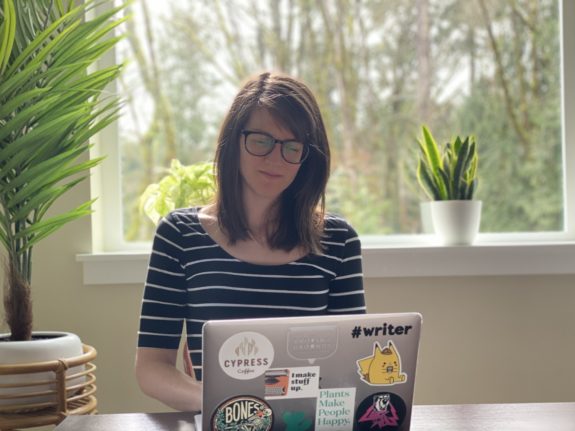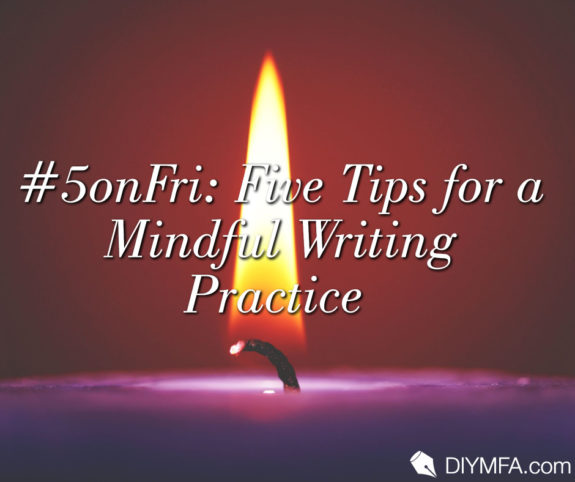As a writer, nothing is more frustrating than ending a writing session with a blank page. Sometimes outside distractions like family, pets, or social media cause us to lose focus. Or sometimes internal forces like worry, doubt, or anxiety that stop our fingers from adding words to the page. Either way, it’s frustrating. We’re writers—we love to write! But despite all the words inside our heads and all our good intentions to get them on paper, sometimes that blank page stays blank.
So how can we write with purpose and focus even when the cat is chewing the plants or we’re anxious about an upcoming deadline? One answer is to create a more mindful writing practice. Becoming mindful of your goals or desire to write, can help make each time you sit down fulfilling and productive. Here are five ways to create a more mindful writing practice.
1. Set an intention
If you want to reach a specific goal during your next writing session, consider setting an intention. This shouldn’t be a multi-step or long-term goal like finishing your novel. Instead, scale it to the time you’ve allotted for writing. For example, if you have two hours available, you could set an intention to write 2,000 words or work through a complex love scene.
Once you have your intention, write it down on a sticky note or notepad and place it within view. You can also turn your intention into a spoken affirmation and repeat it several times before or during your writing. Displaying or speaking your intention directs your energy into one achievable goal, giving you clarity and purpose as you write.
2. Light a candle
Lighting a candle before your writing session is an excellent way to establish a writing routine. Routines provide structure, help build good habits, and reinforce goals. We often think of routines as the boring, mandatory things we need to complete for a successful life. However, even something as simple and fun as lighting a candle can be a routine.
Use the candle to align your focus on writing. As you light it, think about why you’re there and what you want to accomplish. Remind yourself that any chores or obligations can wait. When I use this method, I imagine that no other distractions can enter my space while the candle is lit. It’s like a spell that can’t be broken until I extinguish the flame. After performing this a few times, you’ll associate the lighting and scent of a candle with a productive writing session.
3. Breathing or grounding exercises
Breathing and grounding exercises are a large part of yoga practices. These exercises enhance your yoga practice by bringing awareness to your physical body and centering your attention on the present. They can also create a more mindful writing discipline.
There are a variety of breathing exercises out there and Google will give you hundreds of hits. Some are rooted in yoga or meditation practices and others are mental health focused. If you’re stuck on which breathing exercise to try, a common one is to inhale for a count of 5 and then exhale for 5. You don’t need to time yourself as the goal is not to be exact, but to regulate your breathing so you’re inhaling and exhaling at a similar rate.
You could also try a grounding exercise which is another common practice in yoga. With grounding exercises, you physically connect with the earth and explore any sensations in your body. My favorite grounding method is to lie on the floor and feel the length of my body connecting to the earth. If laying down is uncomfortable, you can also ground yourself by sitting in a chair and concentrating on your feet touching the floor.
You can also combine both techniques for a powerful experience. No matter which exercise you choose, or which variation you choose, these options can help you focus on the present. Which you can then channel into your writing session.
4. Free write or draw
This one may seem strange—writing before you write to help you write? But free writing or free association writing is a great way to clear your mind. This process allows you to get everything in your head onto the page and then set it aside until later. And the best part? You already have the tools in front of you!
With your preferred writing tools, spend ten to fifteen minutes writing or typing anything that comes into your mind. Don’t worry about spelling, grammar, or coherence. When I free write, I’ll sometimes create a bullet point list of all the “to-dos” zipping around my head. Afterwards, I give myself permission to block them out until later. Since they’re already on paper, there’s no reason to worry that I’ll forget.
You can also use this time to free draw. Without judgement, draw on the page for ten to fifteen minutes. Grab markers, pencils, paints, chalk, or anything you want! For double the fun, combine free writing with free drawing to create a unique experience.
There is no wrong way to free write or draw. A pro tip though—use the timer on your phone to notify you when the ten to fifteen minutes is up. This way you’re not interrupting your writing or drawing to check the time. Once your time is up, place your writing or drawing to the side and remind yourself that any of the thoughts on the page can wait until you’re done writing.
5. Grab your favorite beverage
Similar to lighting a candle, grabbing your favorite beverage before a writing session establishes a routine for yourself. Making your favorite tea, coffee, or other beverage helps you associate the act with preparing to write.
As you’re making the drink or sitting down to take the first sip, remind yourself that this is your time to write. You’ve carved out this time for yourself and it’s an opportunity to develop your craft. Try thinking of the beverage as the bell that starts a race. Once it chimes, direct all of your attention on the task at hand.
No matter which activity you choose, the most important thing to remember is the time you set aside is for your writing. Any other thought, obligation, or concern can wait until you’re done. This is your time to enhance your craft and progress on projects. Focusing your attention on the moment or setting a routine can help you achieve a more fulfilling and productive practice. Because if there’s one thing writers love, it’s getting words on the page.

Ginnye Lynn Cubel is a writer, podcast host, and coffee enthusiast. She is passionate about teaching creative writing to kids and volunteers with local organizations. Ginnye is working on her first novel Ophelium, a dark and magical take on the story of Ophelia and the repercussions of insanity. You can follow along on her website or on Twitter and Instagram.







